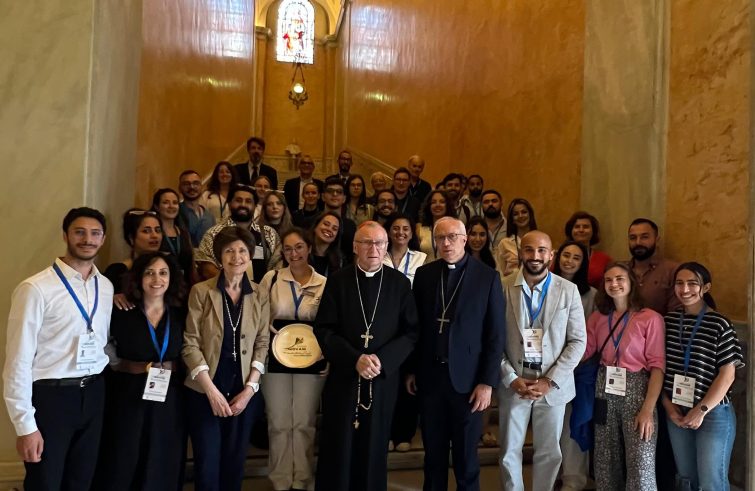
One year after its creation, the Mediterranean Youth Council is holding its first meeting. The event is promoted by the Italian Bishops’ Conference (CEI) with the aim of encouraging a spirit of fraternity and mutual welcome, dialogue and solidarity between the peoples of different faiths and cultures in the Mediterranean area (Mare Nostrum). Until Sunday 21 July, the 34 members of the Council, representing diverse economic and socio-political backgrounds, will exchange views and experiences and work together towards the construction of a future of peace. Fadi, a 25-year-old from Jerusalem who carries the burden of nine months of conflict, has long dreamed of this peace. “The Bible says that Jerusalem is a land of peace, but it has never known peace. Its history is one of conflict and suffering”, he says. As a young man, I have a deep desire for peace in my heart and I call for it loud and clear. It can only be achieved through commitment, cooperation and dialogue. The Council members, aged between 18 and 28, come from the following countries Italy, France, Spain, Slovenia, Croatia, Albania, Bosnia, Montenegro, Greece, Cyprus, Malta, Turkey, Iraq, Syria, Lebanon, the Holy Land, Egypt, Algeria and Tunisia. There are countries where conflicts risk becoming entrenched and others that have enjoyed decades of peace.
Their serenity is what Fadi will transmit to his peers when he returns to Jerusalem: “a message of hope,” he says. He is savouring every moment of this week, “immersed in an unprecedented experience”, on his second visit to Italy.
Over the past year, during the online meetings that have led to the planning and development of the projects, Fadi has seen himself and the other members of the Council progress and become more mature. “It has given us new insights,” he says. “I will share this experience with my bishop and with the young people of my community, so that the hope for peace may flourish in their hearts.” The Council, inspired by the thought of the “Holy Mayor” Giorgio La Pira, is a key outcome of the “Mediterranean of Peace” meeting promoted by the Italian bishops in Florence in February 2022. Its 34 members have been appointed by the respective Episcopal Conferences and Synods of Eastern Catholic Churches. They are meeting in Rome, Fiesole, Florence and La Verna this week. Yesterday, Tuesday 16 July, accompanied by the Secretary of the Italian Bishops’ Conference, Monsignor Giuseppe Baturi, they were received at the Vatican by the Secretary of State, Cardinal Pietro Parolin.
“He showed a deep interest in the project and in the work of the Council,” says Emile, a 25-year-old representing the Synod of the Maronite Church in Lebanon and serving on the Council’s Board. “It was important for us to inform him about our activities and show him the fruits of our efforts. He asked to speak with each one of us. He wanted to find out more about our experiences. He gave us his blessing and encouraged us to keep up the good work.” Lebanon has been facing a severe economic crisis for years, exacerbated by the absence of a national president for almost two years. “We are planning to set up partnerships with other countries facing similar crises,” adds Emile. “It would represent a fruitful opportunity to exchange experiences, to learn about other cultures and traditions and to understand how other people experience difficulties and the promotion of human dignity.”
The Council, under the auspices of the Italian Episcopal Conference, has been entrusted to the “Giorgio La Pira” Foundation, the “Giovanni Paolo II” Foundation, the “Giorgio La Pira” International Students’ Centre and the “Giorgio La Pira” Youth Organisation, which together make up the Mare Nostrum network.
Patrizia Giunti, President of the Network and the Giorgio La Pira Foundation in Florence, notes that the first year of the Council’s work ”was marked by the unprecedented, tragic Israeli-Palestinian conflict. Many of the young people come from war-torn areas and this week of meetings in Italy has meant a change in their everyday lives. Their enthusiasm and their testimonies demonstrate the continued relevance of Giorgio’s message of peace. It serves as a guiding light for the younger generations.” Nicholle Salerno comes from the city of Brindisi, which gained recognition for its welcoming spirit in the early 1990s, when twenty-five thousand Albanian refugees arrived in its port in makeshift boats. For her, serving on the Council symbolises ”the bond that my city has with the sea and the surrounding region. Extending our gaze to the sea helps us build networks by valuing diversity.” For Aleks from Slovenia, the Council is ”an enriching experience of sharing, a chance to learn about the challenges and opportunities of each country”. Divided into thematic working groups, the young participants will focus on four areas: religious formation; formal and informal education; social doctrine and civic engagement; networking, ecumenical and inter-religious dialogue. Aleks and his group are currently developing an Instagram channel where they will “promote the Council’s activities, spread awareness of the projects and promote evangelisation themes.”












